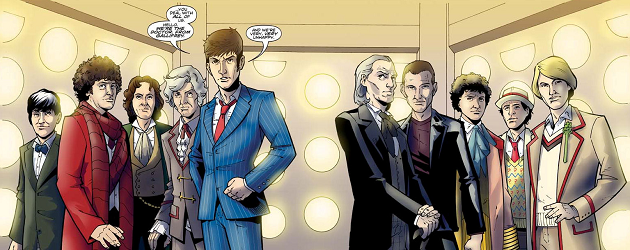Doctor Who is an intimidating universe to get into. Like any piece of culture that has a couple decades’ worth of back story, jumping right in seems like a bad option; you don’t want to risk being overwhelmed and leaving, digusted, with a bad taste in your mouth.
 What complicates matters further is the nature of the title character himself; instead of just dealing with reboots and different interpretations of classic stories, Doctor Who presses for originality, saying The Doctor “regenerates” with every actor change, owing to his new appearance. This establishes a continuity, which, if followed, leaves a staggering 47 years worth of material, dating all the way back to The Doctor’s first appearance in 1963. It is one thing to shotgun seven seasons of Star Trek: The Next Generation in a summer, but this is something different all together.
What complicates matters further is the nature of the title character himself; instead of just dealing with reboots and different interpretations of classic stories, Doctor Who presses for originality, saying The Doctor “regenerates” with every actor change, owing to his new appearance. This establishes a continuity, which, if followed, leaves a staggering 47 years worth of material, dating all the way back to The Doctor’s first appearance in 1963. It is one thing to shotgun seven seasons of Star Trek: The Next Generation in a summer, but this is something different all together.
This presents a unique situation. Just like children of today are going to say Christian Bale was “their” Batman (instead of Keaton or West), Doctor Who fans will recall “their Doctor”: the incarnation that resonated the best with them, or the first version that they saw. For myself, it’s David Tennant, who played Doctor number ten. Since I’m a relatively new Who fan, I have not had the time to experience the much-lauded, scarf-wearing Fourth Doctor (played by Tom Baker), or any of the ones that followed him.
It is a sad day when you realize that the actor has had enough of the role and decides to move on, leaving a new person to fill their shoes. This new Doctor is instantly compared to that favorite, and in some cases, may never live up to expectations.
However, the magical medium of comic books has presented a unique situation to this problem by saying “screw you” to the current continuity and printing stories that are retroactive to the current story. That means that even though Tom Baker has not played the role in decades, I can still read stories written in the spirit of the original character – and without the creepy slash fiction overtones that seem to emanate from fanfiction.net.
IDW Publishing (who tackle a lot of other TV properties, like Transformers, GI Joe, and Star Trek) have partnered with the BBC to bring the Eleventh Doctor (who I’m not too fond of) to the printed page for his future fans to enjoy. With promises that issues #2-4 will deal with Jack The Ripper, I can say that there will probably be a jolly old English time for all. Frankly, I’m pretty certain that a BBC-funded TV show centered on time travel has probably dealt with him before (I’ll get back to you on that one), but I’ll let it go in favor of bringing fresh stories to the newest crop of fans.
My biggest worry is that it won’t satisfy the basic need of licensed comic book writing and fail to emulate the tone of the show. If I am going to spend money on a story that features a character that is portrayed in a certain way, they’d better damn sure be acting the same way as they do regularly.
That’s the same as Snake-Eyes, a regularly mute GI Joe character, suddenly becoming a one-liner machine. It would show disrespect to both the material (for not paying enough attention to detail) and the readers (by thinking we’d be stupid enough not to notice).
So god speed, IDW. If the TARDIS is colored wrong and ends up being red in a panel, you’ll certainly hear from me.
Matt Demers
contact@ComicAttack.net



I could never get into DW. I mean, I used to watch it on TV when I was a pup, but I just didn’t get it.
It’s bad in the British “supposed to be” way. I had a problem with the numerous unavenged deaths, but I figured that was the price of being near The Doctor.
I usually hear good things about DW though I’ve never been able to sit down and get into the series. It’s funny because a lot of what I do hear sounds kinda cool and interesting but I think if I tried to jump into the story now I’d be wayyyyy behind and just totally lost.
Pingback: Tweets that mention The Doctor Comes to IDW: What Licensed Comics Need to Do Right -- Topsy.com